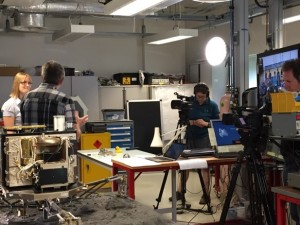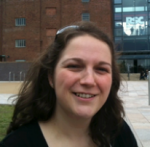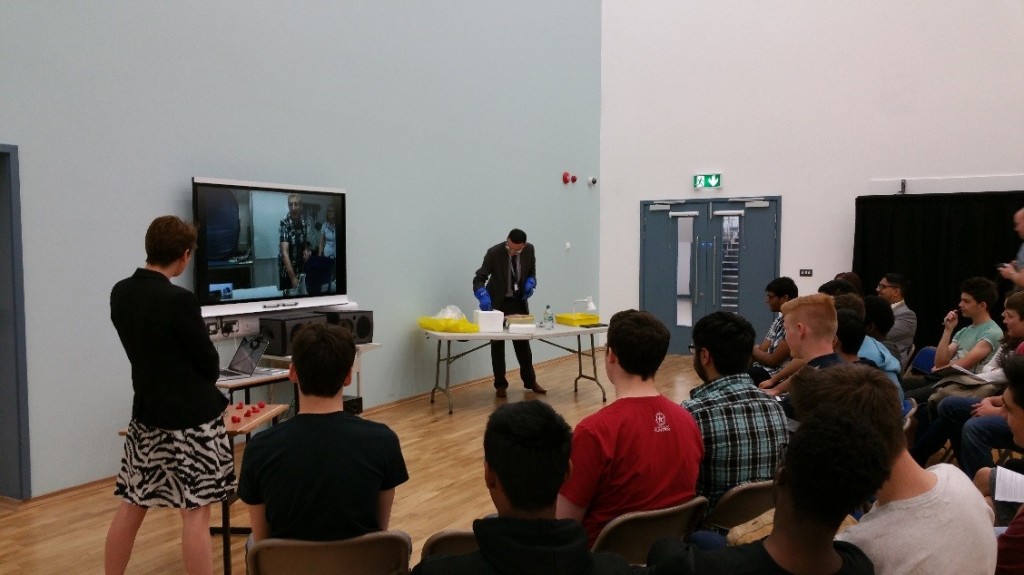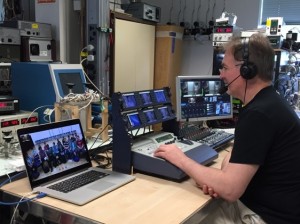Dr Vic Pearson led the organisation of a ‘Labcast’, connecting Open University researchers with teachers and students from Denbigh School in Milton Keynes. Vic worked on this project with Dr Simon Sheridan, Dr Trevor Collins, Dr Gareth Davies and Professor Richard Holliman from the Open University; and Jenny Hallam, Helen Brown and Mark Russell from Denbigh School in Milton Keynes.
What is a Labcast?
A ‘Labcast’ is an interactive, live web broadcast that integrates video streaming and instant messaging to enable a conversation between two or more locations.
A short video explaining the concept of a Labcast can be viewed in the short video below.
Access to ‘cutting edge’ research
Initially developed for Open University (OU) undergraduate teaching, the Labcast model offers a number of advantages:
- 1. Provides access to a working laboratory and researcher.
- 2. Provides more opportunities for curriculum links than a ‘lab tour’ format;
- 3. Does not require students to be taken off timetable or transport costs to be found.
- 4. Has fewer implications for laboratories that are heavily used.
- 5. Contextualises researchers and their science in an authentic working environment.
Labcasting the Rosetta Mission
Here we describe the use of a Labcast to deliver a 1-hour physics lesson to an A-level class of 25 Denbigh School students in Milton Keynes from a laboratory at the Open University’s Walton Hall Campus.

Dr Simon Sheridan and Jenny Hallam delivering the ‘labcast’ at the Open University, facilitated by the technical team. Photo: Vic Pearson.
Engaging students with the curriculum via ‘cutting edge research’
The Open University researcher (Dr Simon Sheridan) is a Rosetta Mission scientist who had been involved in the design and build of the OU’s Ptolemy instrument on-board Rosetta’s Philae lander.
Simon was actively engaged in interpreting data from the comet’s surface. Some of this data was used in the Labcast having just been published in the world-leading academic journal Science.
The laboratory used for the Labcast was that used for testing the Ptolemy ground reference models, providing authenticity.
Provide development activities for teacher and researcher
Both the teacher (Jenny Hallam) and researcher used this activity as a career and professional development (CPD) activity. They collaborated on the development, design and delivery of the scheme of work for the Labcast, sharing pedagogical approaches and subject knowledge. They also gained the experience of engaging with others using a novel mix of media.
Technology
The Labcast was recorded by three audio-visual experts led by Dr Trevor Collins. The team used static and roving cameras, and was broadcast as a high-definition video stream via FaceTime.
Third party videos (for example, from ESA and NASA) were incorporated into the live stream and a webcam relayed a view of the classroom back to the lab. Students and presenters interacted using FaceTime.
Content and structure
The Labcast incorporated passive elements, for example, presenting to camera, interview-style dialogue; and interactive elements, including a lab experiment mirrored in the school, a maths workshop, and a problem solving activity. A pre-Labcast activity was set, which meant a group activity was possible, and time for Q&A was built in.
Recommendations for future Labcasts
- Early interaction between teacher and researcher is crucial.
- Students benefitted from preparation before the event; further follow up activities could also be effective.
- A different format, for example, several shorter Labcasts over an academic year might provide a more effective teaching tool and minimize concerns over ‘time out’ of lessons.
- A different delivery medium, for example, using mobile phones, may enable Labcasts to be set up and delivered more frequently.
Acknowledgements
This post discusses research and interventions developed through the Open University’s RCUK-funded School-University Partnership Initiative, ‘Engaging Opportunities‘, a partnership between the Open University and the Denbigh Teaching School Alliance.
The RCUK Teacher CPD Initiating ‘Bringing Cutting Edge Research into the Classroom‘ part funded the Labcast.



